Shareholder Power and Director Duties in Business and Enterprise Law
VerifiedAdded on 2023/01/17
|10
|2748
|30
Report
AI Summary
This report delves into the legal framework governing the relationship between shareholders and directors in business and enterprise law. It explores the various methods shareholders employ to exert supervisory control over the board of directors, including derivative actions, applications for winding up the company, and actions for unfair prejudice. The report analyzes the relevant sections of the Companies Act 2006 and examines key case studies such as Foss v/s Harbottle, Ebrahimi versus Westbourne Galleries Ltd, and O’Neill v Phillips to illustrate the practical application of these rights. Furthermore, the report outlines the duties of directors, including their responsibilities under sections 171, 172, and 174 of the Companies Act, and their fiduciary duties to act in the best interests of the company. The report discusses remedies for breach of these duties and the consequences under the Company Directors Disqualification Act 1986. The content provides a comprehensive overview of corporate governance, emphasizing the balance of power and responsibilities between shareholders and directors within a company.
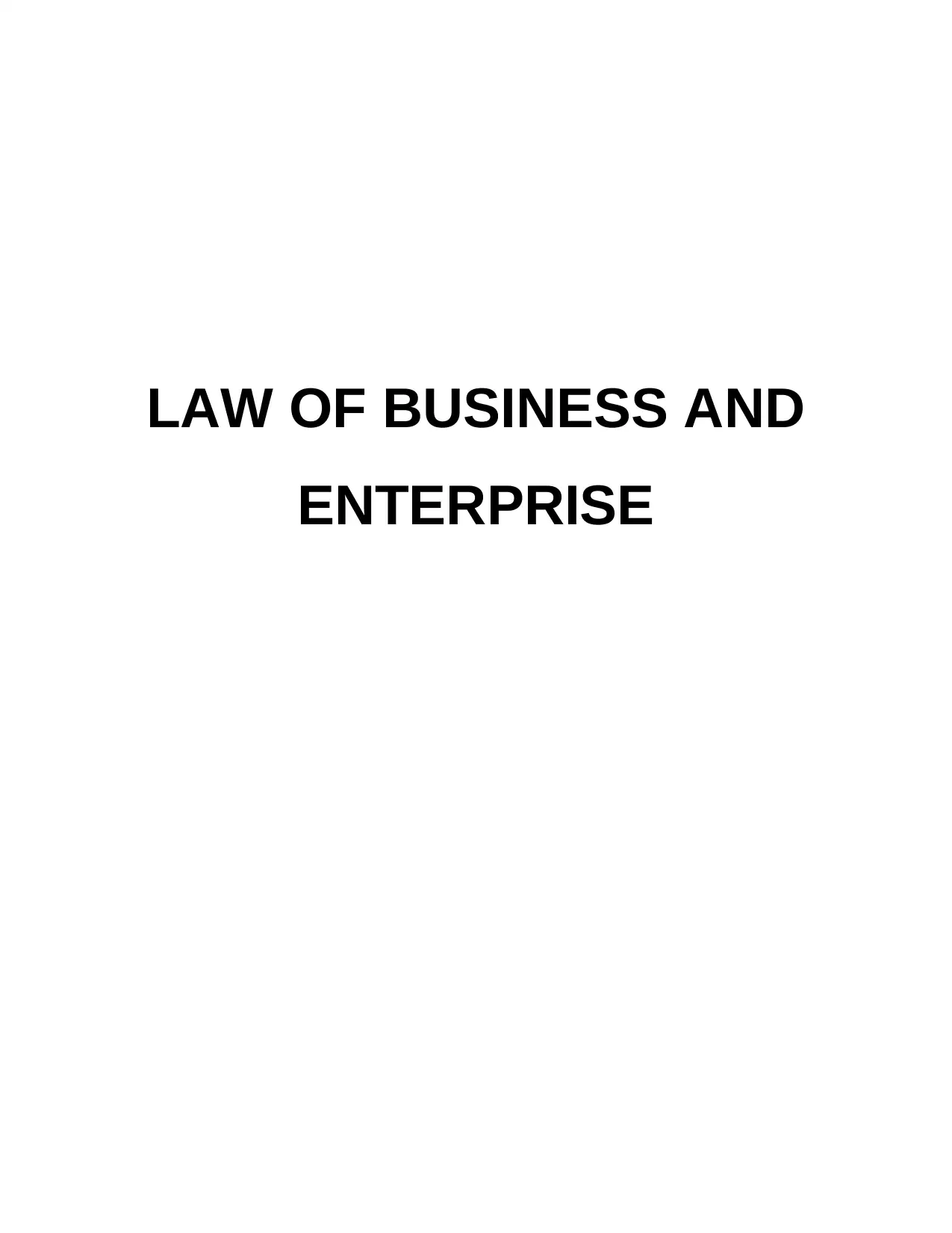
LAW OF BUSINESS AND
ENTERPRISE
ENTERPRISE
Paraphrase This Document
Need a fresh take? Get an instant paraphrase of this document with our AI Paraphraser
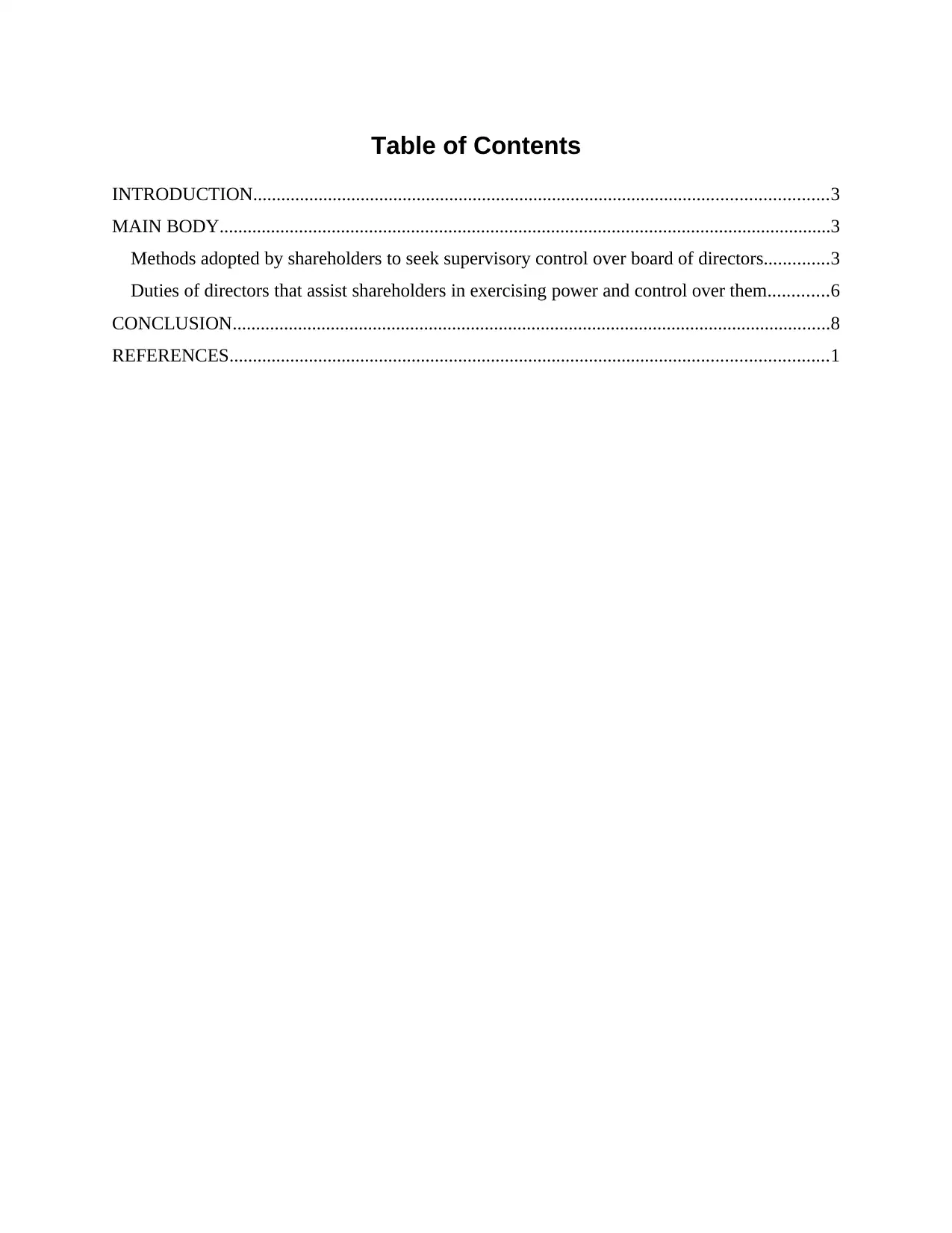
Table of Contents
INTRODUCTION...........................................................................................................................3
MAIN BODY...................................................................................................................................3
Methods adopted by shareholders to seek supervisory control over board of directors..............3
Duties of directors that assist shareholders in exercising power and control over them.............6
CONCLUSION................................................................................................................................8
REFERENCES................................................................................................................................1
INTRODUCTION...........................................................................................................................3
MAIN BODY...................................................................................................................................3
Methods adopted by shareholders to seek supervisory control over board of directors..............3
Duties of directors that assist shareholders in exercising power and control over them.............6
CONCLUSION................................................................................................................................8
REFERENCES................................................................................................................................1
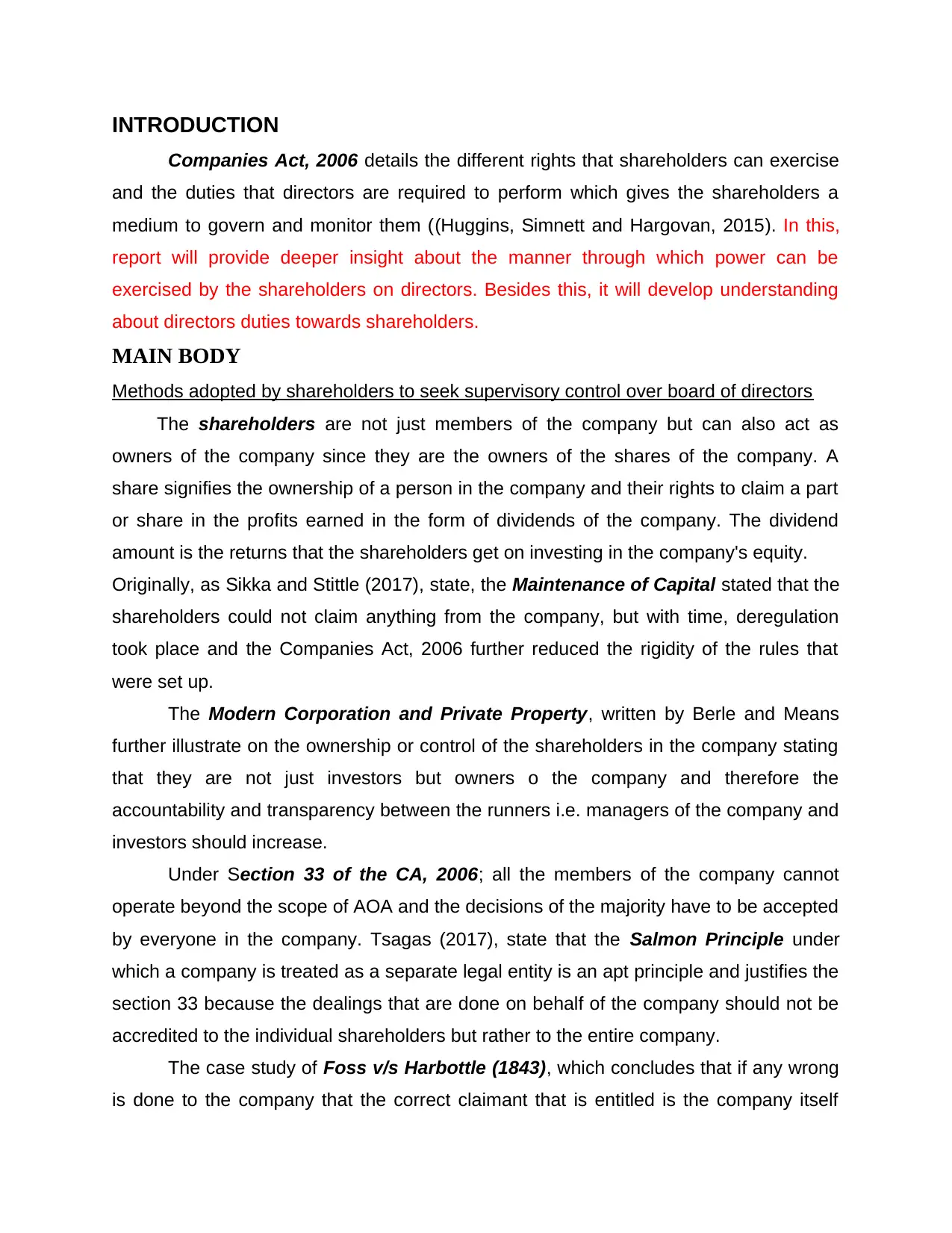
INTRODUCTION
Companies Act, 2006 details the different rights that shareholders can exercise
and the duties that directors are required to perform which gives the shareholders a
medium to govern and monitor them ((Huggins, Simnett and Hargovan, 2015). In this,
report will provide deeper insight about the manner through which power can be
exercised by the shareholders on directors. Besides this, it will develop understanding
about directors duties towards shareholders.
MAIN BODY
Methods adopted by shareholders to seek supervisory control over board of directors
The shareholders are not just members of the company but can also act as
owners of the company since they are the owners of the shares of the company. A
share signifies the ownership of a person in the company and their rights to claim a part
or share in the profits earned in the form of dividends of the company. The dividend
amount is the returns that the shareholders get on investing in the company's equity.
Originally, as Sikka and Stittle (2017), state, the Maintenance of Capital stated that the
shareholders could not claim anything from the company, but with time, deregulation
took place and the Companies Act, 2006 further reduced the rigidity of the rules that
were set up.
The Modern Corporation and Private Property, written by Berle and Means
further illustrate on the ownership or control of the shareholders in the company stating
that they are not just investors but owners o the company and therefore the
accountability and transparency between the runners i.e. managers of the company and
investors should increase.
Under Section 33 of the CA, 2006; all the members of the company cannot
operate beyond the scope of AOA and the decisions of the majority have to be accepted
by everyone in the company. Tsagas (2017), state that the Salmon Principle under
which a company is treated as a separate legal entity is an apt principle and justifies the
section 33 because the dealings that are done on behalf of the company should not be
accredited to the individual shareholders but rather to the entire company.
The case study of Foss v/s Harbottle (1843), which concludes that if any wrong
is done to the company that the correct claimant that is entitled is the company itself
Companies Act, 2006 details the different rights that shareholders can exercise
and the duties that directors are required to perform which gives the shareholders a
medium to govern and monitor them ((Huggins, Simnett and Hargovan, 2015). In this,
report will provide deeper insight about the manner through which power can be
exercised by the shareholders on directors. Besides this, it will develop understanding
about directors duties towards shareholders.
MAIN BODY
Methods adopted by shareholders to seek supervisory control over board of directors
The shareholders are not just members of the company but can also act as
owners of the company since they are the owners of the shares of the company. A
share signifies the ownership of a person in the company and their rights to claim a part
or share in the profits earned in the form of dividends of the company. The dividend
amount is the returns that the shareholders get on investing in the company's equity.
Originally, as Sikka and Stittle (2017), state, the Maintenance of Capital stated that the
shareholders could not claim anything from the company, but with time, deregulation
took place and the Companies Act, 2006 further reduced the rigidity of the rules that
were set up.
The Modern Corporation and Private Property, written by Berle and Means
further illustrate on the ownership or control of the shareholders in the company stating
that they are not just investors but owners o the company and therefore the
accountability and transparency between the runners i.e. managers of the company and
investors should increase.
Under Section 33 of the CA, 2006; all the members of the company cannot
operate beyond the scope of AOA and the decisions of the majority have to be accepted
by everyone in the company. Tsagas (2017), state that the Salmon Principle under
which a company is treated as a separate legal entity is an apt principle and justifies the
section 33 because the dealings that are done on behalf of the company should not be
accredited to the individual shareholders but rather to the entire company.
The case study of Foss v/s Harbottle (1843), which concludes that if any wrong
is done to the company that the correct claimant that is entitled is the company itself
⊘ This is a preview!⊘
Do you want full access?
Subscribe today to unlock all pages.

Trusted by 1+ million students worldwide
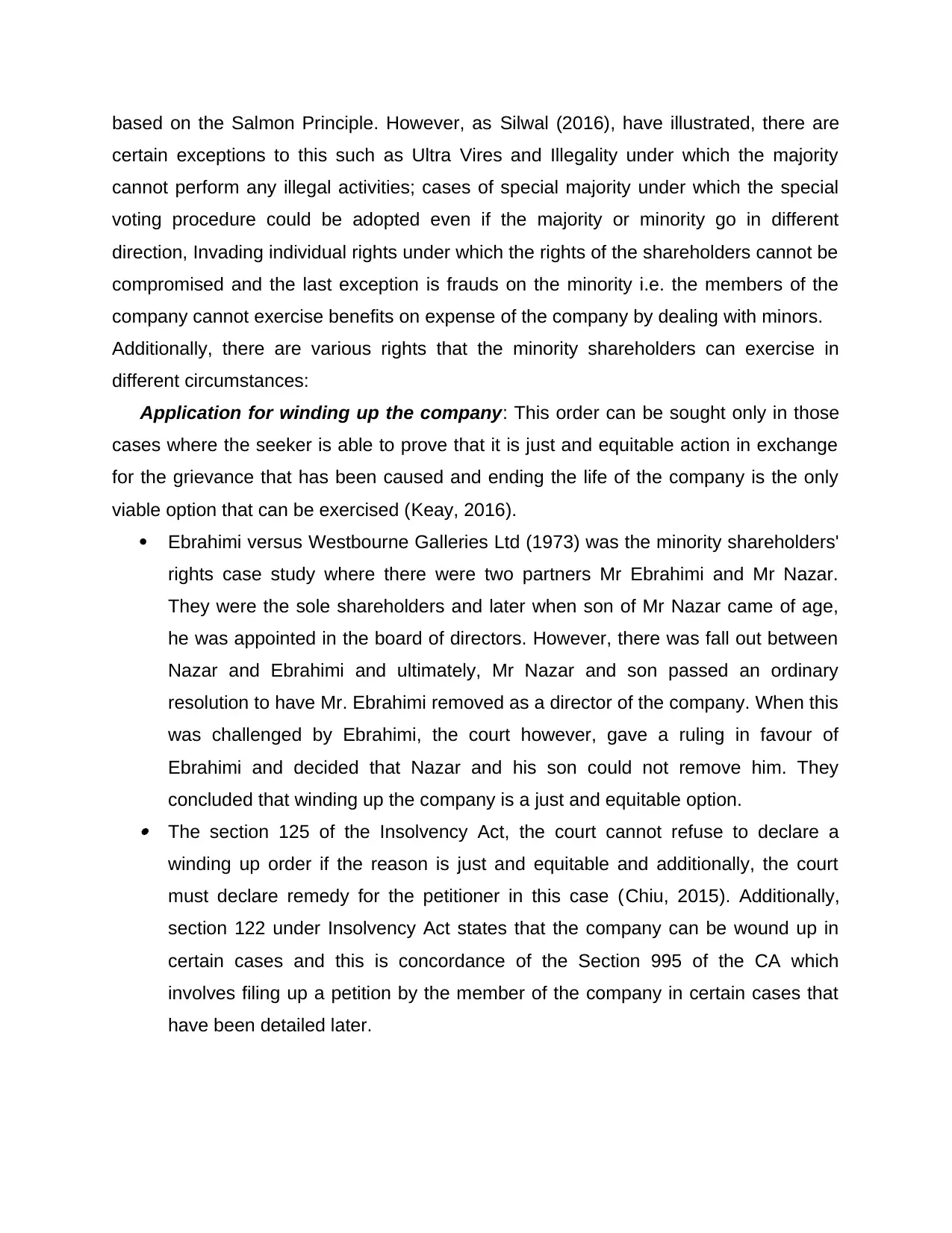
based on the Salmon Principle. However, as Silwal (2016), have illustrated, there are
certain exceptions to this such as Ultra Vires and Illegality under which the majority
cannot perform any illegal activities; cases of special majority under which the special
voting procedure could be adopted even if the majority or minority go in different
direction, Invading individual rights under which the rights of the shareholders cannot be
compromised and the last exception is frauds on the minority i.e. the members of the
company cannot exercise benefits on expense of the company by dealing with minors.
Additionally, there are various rights that the minority shareholders can exercise in
different circumstances:
Application for winding up the company: This order can be sought only in those
cases where the seeker is able to prove that it is just and equitable action in exchange
for the grievance that has been caused and ending the life of the company is the only
viable option that can be exercised (Keay, 2016).
Ebrahimi versus Westbourne Galleries Ltd (1973) was the minority shareholders'
rights case study where there were two partners Mr Ebrahimi and Mr Nazar.
They were the sole shareholders and later when son of Mr Nazar came of age,
he was appointed in the board of directors. However, there was fall out between
Nazar and Ebrahimi and ultimately, Mr Nazar and son passed an ordinary
resolution to have Mr. Ebrahimi removed as a director of the company. When this
was challenged by Ebrahimi, the court however, gave a ruling in favour of
Ebrahimi and decided that Nazar and his son could not remove him. They
concluded that winding up the company is a just and equitable option. The section 125 of the Insolvency Act, the court cannot refuse to declare a
winding up order if the reason is just and equitable and additionally, the court
must declare remedy for the petitioner in this case (Chiu, 2015). Additionally,
section 122 under Insolvency Act states that the company can be wound up in
certain cases and this is concordance of the Section 995 of the CA which
involves filing up a petition by the member of the company in certain cases that
have been detailed later.
certain exceptions to this such as Ultra Vires and Illegality under which the majority
cannot perform any illegal activities; cases of special majority under which the special
voting procedure could be adopted even if the majority or minority go in different
direction, Invading individual rights under which the rights of the shareholders cannot be
compromised and the last exception is frauds on the minority i.e. the members of the
company cannot exercise benefits on expense of the company by dealing with minors.
Additionally, there are various rights that the minority shareholders can exercise in
different circumstances:
Application for winding up the company: This order can be sought only in those
cases where the seeker is able to prove that it is just and equitable action in exchange
for the grievance that has been caused and ending the life of the company is the only
viable option that can be exercised (Keay, 2016).
Ebrahimi versus Westbourne Galleries Ltd (1973) was the minority shareholders'
rights case study where there were two partners Mr Ebrahimi and Mr Nazar.
They were the sole shareholders and later when son of Mr Nazar came of age,
he was appointed in the board of directors. However, there was fall out between
Nazar and Ebrahimi and ultimately, Mr Nazar and son passed an ordinary
resolution to have Mr. Ebrahimi removed as a director of the company. When this
was challenged by Ebrahimi, the court however, gave a ruling in favour of
Ebrahimi and decided that Nazar and his son could not remove him. They
concluded that winding up the company is a just and equitable option. The section 125 of the Insolvency Act, the court cannot refuse to declare a
winding up order if the reason is just and equitable and additionally, the court
must declare remedy for the petitioner in this case (Chiu, 2015). Additionally,
section 122 under Insolvency Act states that the company can be wound up in
certain cases and this is concordance of the Section 995 of the CA which
involves filing up a petition by the member of the company in certain cases that
have been detailed later.
Paraphrase This Document
Need a fresh take? Get an instant paraphrase of this document with our AI Paraphraser
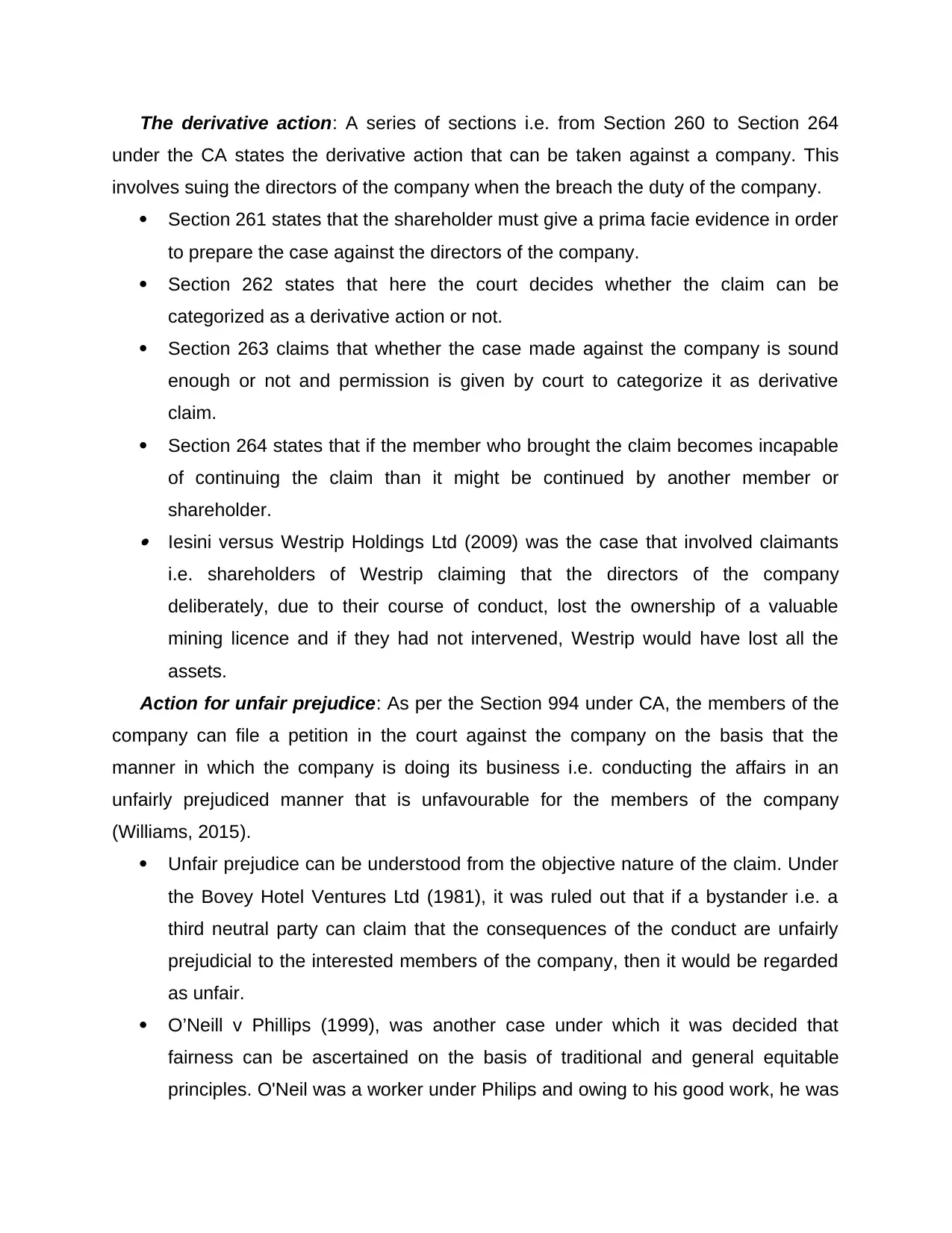
The derivative action: A series of sections i.e. from Section 260 to Section 264
under the CA states the derivative action that can be taken against a company. This
involves suing the directors of the company when the breach the duty of the company.
Section 261 states that the shareholder must give a prima facie evidence in order
to prepare the case against the directors of the company.
Section 262 states that here the court decides whether the claim can be
categorized as a derivative action or not.
Section 263 claims that whether the case made against the company is sound
enough or not and permission is given by court to categorize it as derivative
claim.
Section 264 states that if the member who brought the claim becomes incapable
of continuing the claim than it might be continued by another member or
shareholder. Iesini versus Westrip Holdings Ltd (2009) was the case that involved claimants
i.e. shareholders of Westrip claiming that the directors of the company
deliberately, due to their course of conduct, lost the ownership of a valuable
mining licence and if they had not intervened, Westrip would have lost all the
assets.
Action for unfair prejudice: As per the Section 994 under CA, the members of the
company can file a petition in the court against the company on the basis that the
manner in which the company is doing its business i.e. conducting the affairs in an
unfairly prejudiced manner that is unfavourable for the members of the company
(Williams, 2015).
Unfair prejudice can be understood from the objective nature of the claim. Under
the Bovey Hotel Ventures Ltd (1981), it was ruled out that if a bystander i.e. a
third neutral party can claim that the consequences of the conduct are unfairly
prejudicial to the interested members of the company, then it would be regarded
as unfair.
O’Neill v Phillips (1999), was another case under which it was decided that
fairness can be ascertained on the basis of traditional and general equitable
principles. O'Neil was a worker under Philips and owing to his good work, he was
under the CA states the derivative action that can be taken against a company. This
involves suing the directors of the company when the breach the duty of the company.
Section 261 states that the shareholder must give a prima facie evidence in order
to prepare the case against the directors of the company.
Section 262 states that here the court decides whether the claim can be
categorized as a derivative action or not.
Section 263 claims that whether the case made against the company is sound
enough or not and permission is given by court to categorize it as derivative
claim.
Section 264 states that if the member who brought the claim becomes incapable
of continuing the claim than it might be continued by another member or
shareholder. Iesini versus Westrip Holdings Ltd (2009) was the case that involved claimants
i.e. shareholders of Westrip claiming that the directors of the company
deliberately, due to their course of conduct, lost the ownership of a valuable
mining licence and if they had not intervened, Westrip would have lost all the
assets.
Action for unfair prejudice: As per the Section 994 under CA, the members of the
company can file a petition in the court against the company on the basis that the
manner in which the company is doing its business i.e. conducting the affairs in an
unfairly prejudiced manner that is unfavourable for the members of the company
(Williams, 2015).
Unfair prejudice can be understood from the objective nature of the claim. Under
the Bovey Hotel Ventures Ltd (1981), it was ruled out that if a bystander i.e. a
third neutral party can claim that the consequences of the conduct are unfairly
prejudicial to the interested members of the company, then it would be regarded
as unfair.
O’Neill v Phillips (1999), was another case under which it was decided that
fairness can be ascertained on the basis of traditional and general equitable
principles. O'Neil was a worker under Philips and owing to his good work, he was
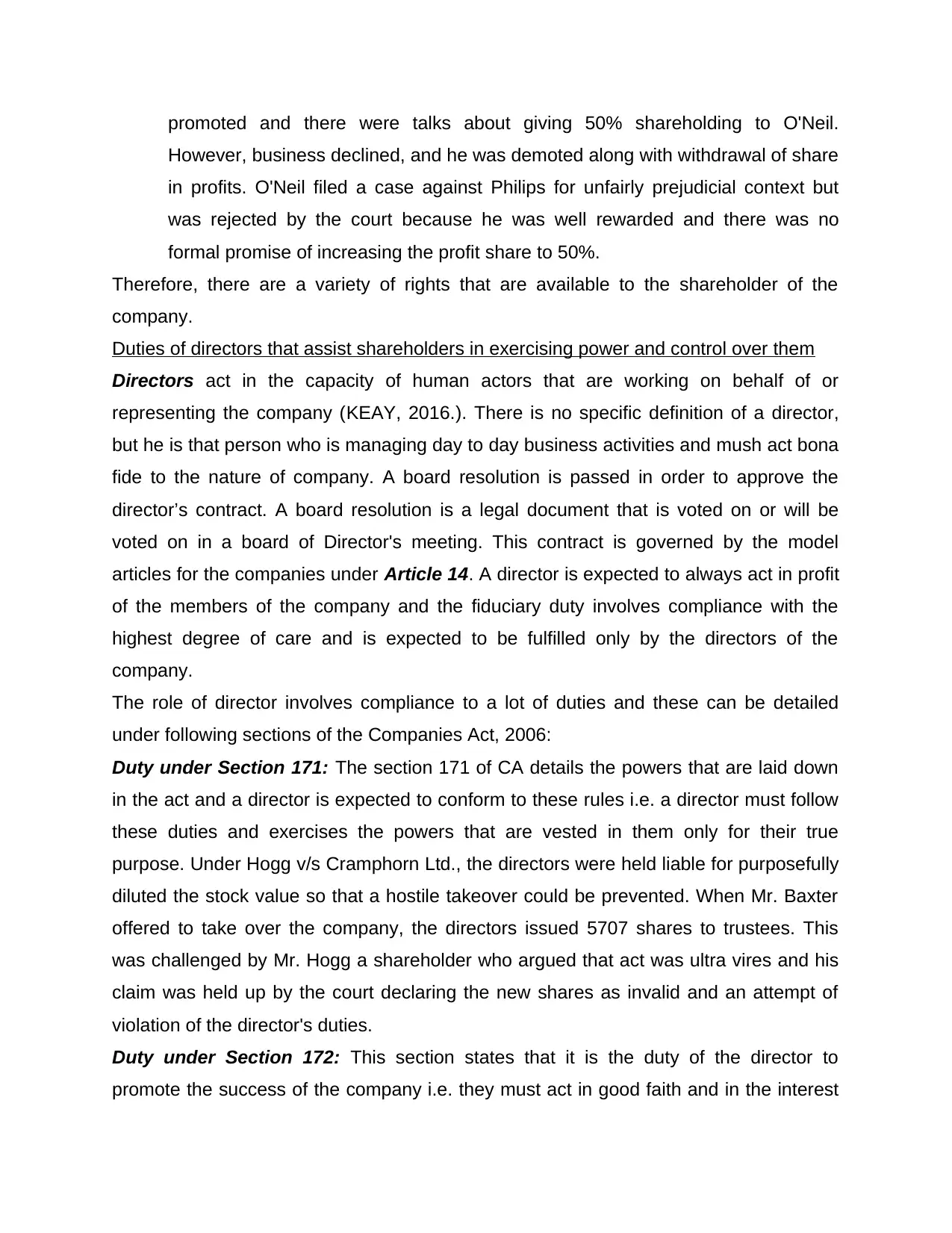
promoted and there were talks about giving 50% shareholding to O'Neil.
However, business declined, and he was demoted along with withdrawal of share
in profits. O'Neil filed a case against Philips for unfairly prejudicial context but
was rejected by the court because he was well rewarded and there was no
formal promise of increasing the profit share to 50%.
Therefore, there are a variety of rights that are available to the shareholder of the
company.
Duties of directors that assist shareholders in exercising power and control over them
Directors act in the capacity of human actors that are working on behalf of or
representing the company (KEAY, 2016.). There is no specific definition of a director,
but he is that person who is managing day to day business activities and mush act bona
fide to the nature of company. A board resolution is passed in order to approve the
director’s contract. A board resolution is a legal document that is voted on or will be
voted on in a board of Director's meeting. This contract is governed by the model
articles for the companies under Article 14. A director is expected to always act in profit
of the members of the company and the fiduciary duty involves compliance with the
highest degree of care and is expected to be fulfilled only by the directors of the
company.
The role of director involves compliance to a lot of duties and these can be detailed
under following sections of the Companies Act, 2006:
Duty under Section 171: The section 171 of CA details the powers that are laid down
in the act and a director is expected to conform to these rules i.e. a director must follow
these duties and exercises the powers that are vested in them only for their true
purpose. Under Hogg v/s Cramphorn Ltd., the directors were held liable for purposefully
diluted the stock value so that a hostile takeover could be prevented. When Mr. Baxter
offered to take over the company, the directors issued 5707 shares to trustees. This
was challenged by Mr. Hogg a shareholder who argued that act was ultra vires and his
claim was held up by the court declaring the new shares as invalid and an attempt of
violation of the director's duties.
Duty under Section 172: This section states that it is the duty of the director to
promote the success of the company i.e. they must act in good faith and in the interest
However, business declined, and he was demoted along with withdrawal of share
in profits. O'Neil filed a case against Philips for unfairly prejudicial context but
was rejected by the court because he was well rewarded and there was no
formal promise of increasing the profit share to 50%.
Therefore, there are a variety of rights that are available to the shareholder of the
company.
Duties of directors that assist shareholders in exercising power and control over them
Directors act in the capacity of human actors that are working on behalf of or
representing the company (KEAY, 2016.). There is no specific definition of a director,
but he is that person who is managing day to day business activities and mush act bona
fide to the nature of company. A board resolution is passed in order to approve the
director’s contract. A board resolution is a legal document that is voted on or will be
voted on in a board of Director's meeting. This contract is governed by the model
articles for the companies under Article 14. A director is expected to always act in profit
of the members of the company and the fiduciary duty involves compliance with the
highest degree of care and is expected to be fulfilled only by the directors of the
company.
The role of director involves compliance to a lot of duties and these can be detailed
under following sections of the Companies Act, 2006:
Duty under Section 171: The section 171 of CA details the powers that are laid down
in the act and a director is expected to conform to these rules i.e. a director must follow
these duties and exercises the powers that are vested in them only for their true
purpose. Under Hogg v/s Cramphorn Ltd., the directors were held liable for purposefully
diluted the stock value so that a hostile takeover could be prevented. When Mr. Baxter
offered to take over the company, the directors issued 5707 shares to trustees. This
was challenged by Mr. Hogg a shareholder who argued that act was ultra vires and his
claim was held up by the court declaring the new shares as invalid and an attempt of
violation of the director's duties.
Duty under Section 172: This section states that it is the duty of the director to
promote the success of the company i.e. they must act in good faith and in the interest
⊘ This is a preview!⊘
Do you want full access?
Subscribe today to unlock all pages.

Trusted by 1+ million students worldwide
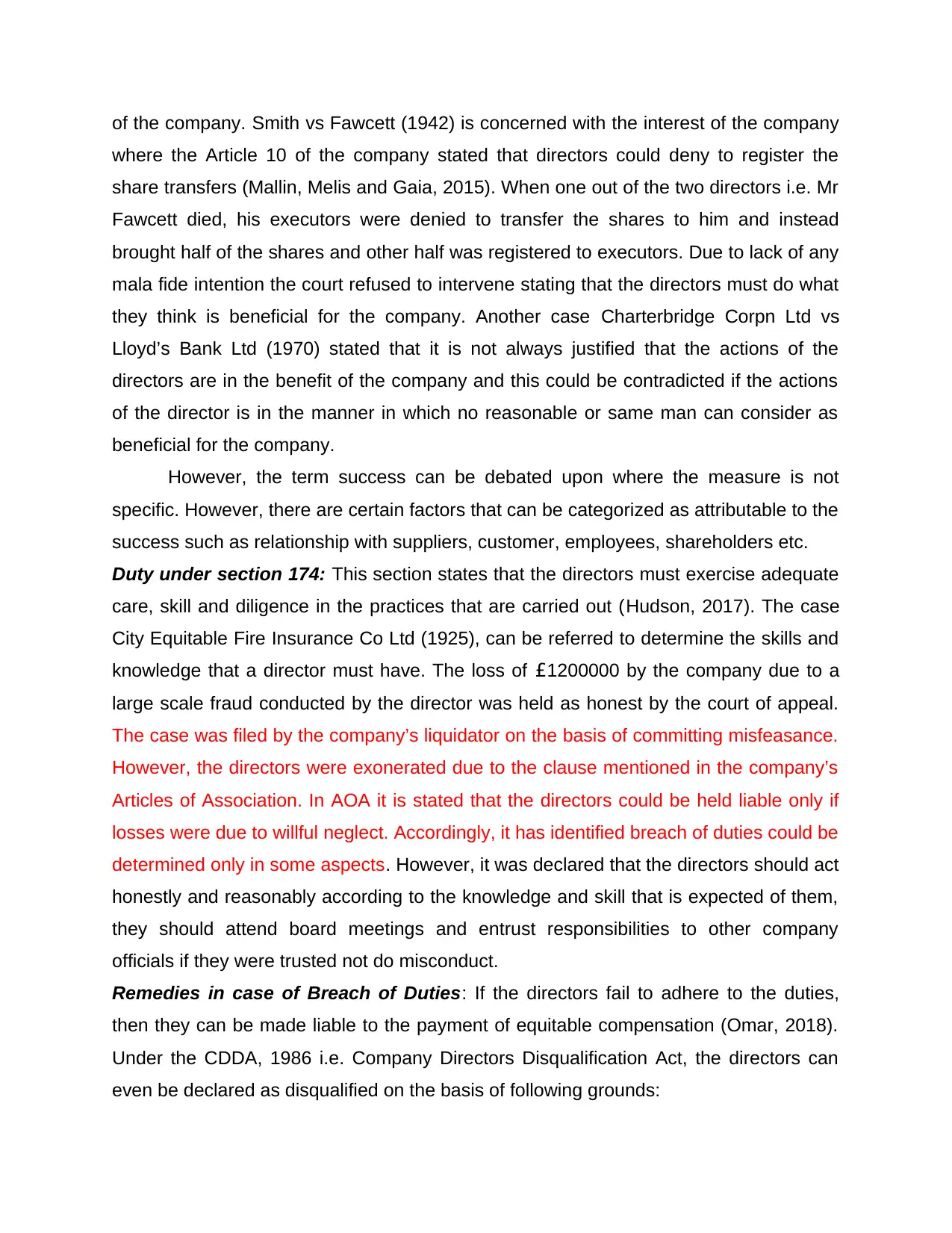
of the company. Smith vs Fawcett (1942) is concerned with the interest of the company
where the Article 10 of the company stated that directors could deny to register the
share transfers (Mallin, Melis and Gaia, 2015). When one out of the two directors i.e. Mr
Fawcett died, his executors were denied to transfer the shares to him and instead
brought half of the shares and other half was registered to executors. Due to lack of any
mala fide intention the court refused to intervene stating that the directors must do what
they think is beneficial for the company. Another case Charterbridge Corpn Ltd vs
Lloyd’s Bank Ltd (1970) stated that it is not always justified that the actions of the
directors are in the benefit of the company and this could be contradicted if the actions
of the director is in the manner in which no reasonable or same man can consider as
beneficial for the company.
However, the term success can be debated upon where the measure is not
specific. However, there are certain factors that can be categorized as attributable to the
success such as relationship with suppliers, customer, employees, shareholders etc.
Duty under section 174: This section states that the directors must exercise adequate
care, skill and diligence in the practices that are carried out (Hudson, 2017). The case
City Equitable Fire Insurance Co Ltd (1925), can be referred to determine the skills and
knowledge that a director must have. The loss of £1200000 by the company due to a
large scale fraud conducted by the director was held as honest by the court of appeal.
The case was filed by the company’s liquidator on the basis of committing misfeasance.
However, the directors were exonerated due to the clause mentioned in the company’s
Articles of Association. In AOA it is stated that the directors could be held liable only if
losses were due to willful neglect. Accordingly, it has identified breach of duties could be
determined only in some aspects. However, it was declared that the directors should act
honestly and reasonably according to the knowledge and skill that is expected of them,
they should attend board meetings and entrust responsibilities to other company
officials if they were trusted not do misconduct.
Remedies in case of Breach of Duties: If the directors fail to adhere to the duties,
then they can be made liable to the payment of equitable compensation (Omar, 2018).
Under the CDDA, 1986 i.e. Company Directors Disqualification Act, the directors can
even be declared as disqualified on the basis of following grounds:
where the Article 10 of the company stated that directors could deny to register the
share transfers (Mallin, Melis and Gaia, 2015). When one out of the two directors i.e. Mr
Fawcett died, his executors were denied to transfer the shares to him and instead
brought half of the shares and other half was registered to executors. Due to lack of any
mala fide intention the court refused to intervene stating that the directors must do what
they think is beneficial for the company. Another case Charterbridge Corpn Ltd vs
Lloyd’s Bank Ltd (1970) stated that it is not always justified that the actions of the
directors are in the benefit of the company and this could be contradicted if the actions
of the director is in the manner in which no reasonable or same man can consider as
beneficial for the company.
However, the term success can be debated upon where the measure is not
specific. However, there are certain factors that can be categorized as attributable to the
success such as relationship with suppliers, customer, employees, shareholders etc.
Duty under section 174: This section states that the directors must exercise adequate
care, skill and diligence in the practices that are carried out (Hudson, 2017). The case
City Equitable Fire Insurance Co Ltd (1925), can be referred to determine the skills and
knowledge that a director must have. The loss of £1200000 by the company due to a
large scale fraud conducted by the director was held as honest by the court of appeal.
The case was filed by the company’s liquidator on the basis of committing misfeasance.
However, the directors were exonerated due to the clause mentioned in the company’s
Articles of Association. In AOA it is stated that the directors could be held liable only if
losses were due to willful neglect. Accordingly, it has identified breach of duties could be
determined only in some aspects. However, it was declared that the directors should act
honestly and reasonably according to the knowledge and skill that is expected of them,
they should attend board meetings and entrust responsibilities to other company
officials if they were trusted not do misconduct.
Remedies in case of Breach of Duties: If the directors fail to adhere to the duties,
then they can be made liable to the payment of equitable compensation (Omar, 2018).
Under the CDDA, 1986 i.e. Company Directors Disqualification Act, the directors can
even be declared as disqualified on the basis of following grounds:
Paraphrase This Document
Need a fresh take? Get an instant paraphrase of this document with our AI Paraphraser
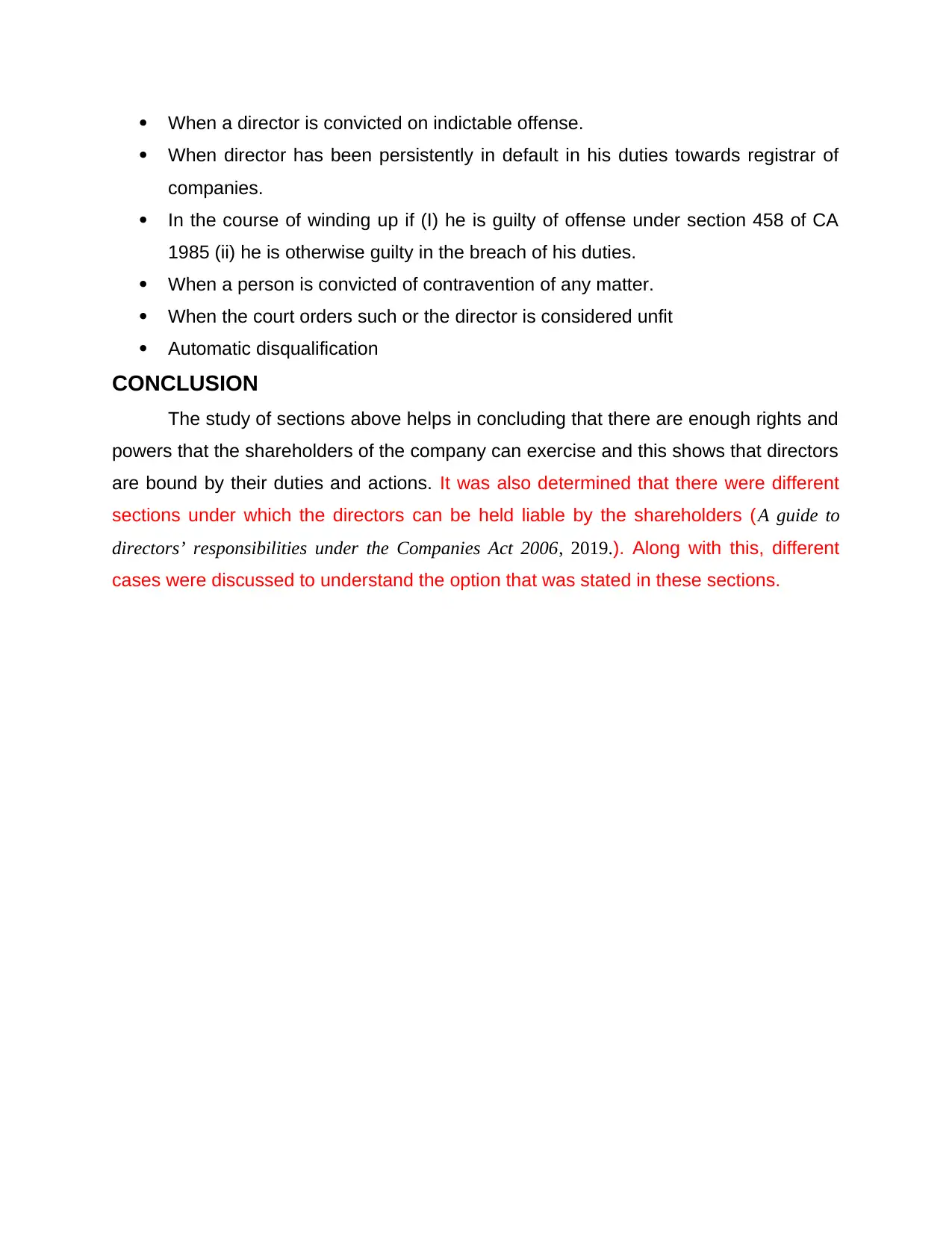
When a director is convicted on indictable offense.
When director has been persistently in default in his duties towards registrar of
companies.
In the course of winding up if (I) he is guilty of offense under section 458 of CA
1985 (ii) he is otherwise guilty in the breach of his duties.
When a person is convicted of contravention of any matter.
When the court orders such or the director is considered unfit
Automatic disqualification
CONCLUSION
The study of sections above helps in concluding that there are enough rights and
powers that the shareholders of the company can exercise and this shows that directors
are bound by their duties and actions. It was also determined that there were different
sections under which the directors can be held liable by the shareholders (A guide to
directors’ responsibilities under the Companies Act 2006, 2019.). Along with this, different
cases were discussed to understand the option that was stated in these sections.
When director has been persistently in default in his duties towards registrar of
companies.
In the course of winding up if (I) he is guilty of offense under section 458 of CA
1985 (ii) he is otherwise guilty in the breach of his duties.
When a person is convicted of contravention of any matter.
When the court orders such or the director is considered unfit
Automatic disqualification
CONCLUSION
The study of sections above helps in concluding that there are enough rights and
powers that the shareholders of the company can exercise and this shows that directors
are bound by their duties and actions. It was also determined that there were different
sections under which the directors can be held liable by the shareholders (A guide to
directors’ responsibilities under the Companies Act 2006, 2019.). Along with this, different
cases were discussed to understand the option that was stated in these sections.
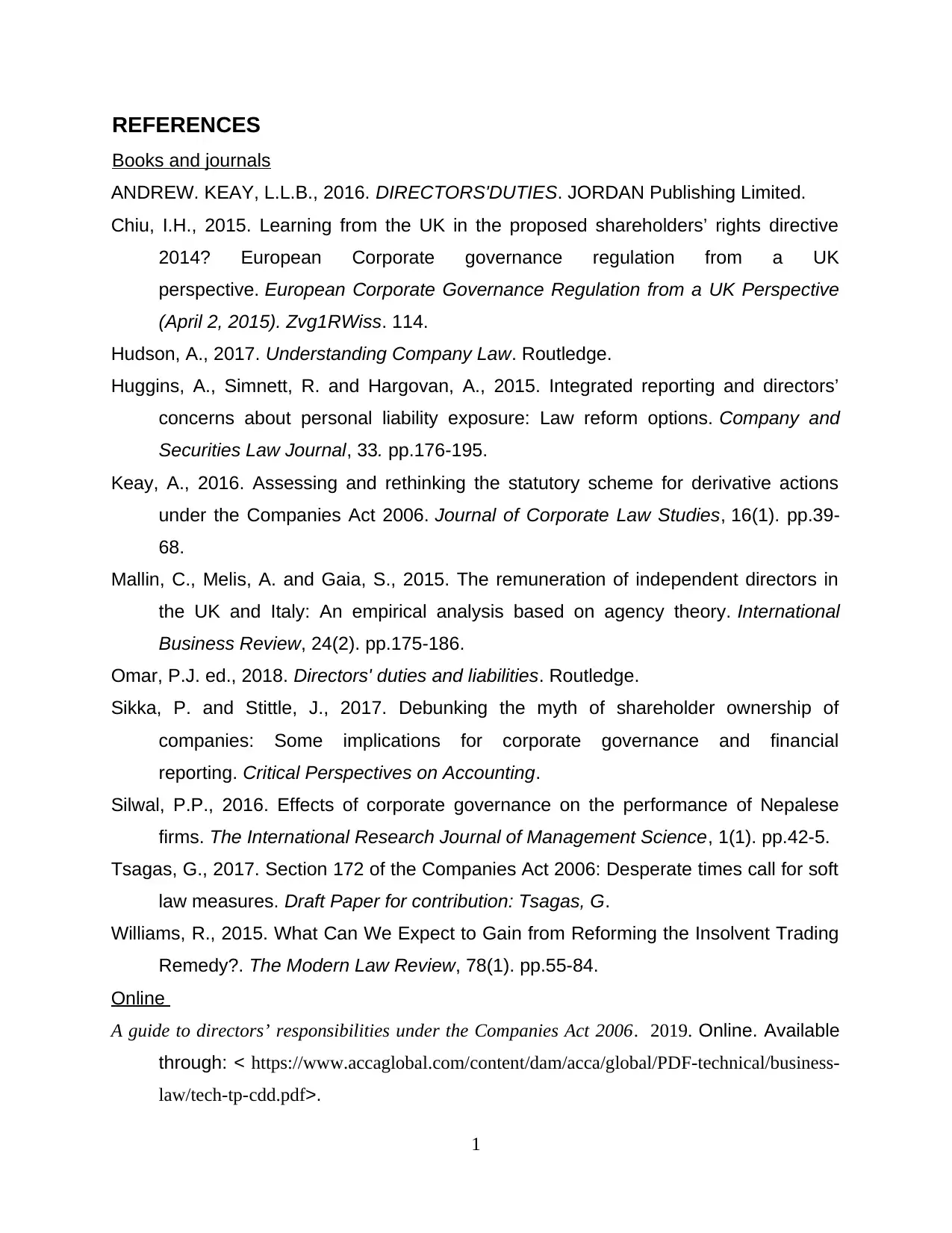
REFERENCES
Books and journals
ANDREW. KEAY, L.L.B., 2016. DIRECTORS'DUTIES. JORDAN Publishing Limited.
Chiu, I.H., 2015. Learning from the UK in the proposed shareholders’ rights directive
2014? European Corporate governance regulation from a UK
perspective. European Corporate Governance Regulation from a UK Perspective
(April 2, 2015). Zvg1RWiss. 114.
Hudson, A., 2017. Understanding Company Law. Routledge.
Huggins, A., Simnett, R. and Hargovan, A., 2015. Integrated reporting and directors’
concerns about personal liability exposure: Law reform options. Company and
Securities Law Journal, 33. pp.176-195.
Keay, A., 2016. Assessing and rethinking the statutory scheme for derivative actions
under the Companies Act 2006. Journal of Corporate Law Studies, 16(1). pp.39-
68.
Mallin, C., Melis, A. and Gaia, S., 2015. The remuneration of independent directors in
the UK and Italy: An empirical analysis based on agency theory. International
Business Review, 24(2). pp.175-186.
Omar, P.J. ed., 2018. Directors' duties and liabilities. Routledge.
Sikka, P. and Stittle, J., 2017. Debunking the myth of shareholder ownership of
companies: Some implications for corporate governance and financial
reporting. Critical Perspectives on Accounting.
Silwal, P.P., 2016. Effects of corporate governance on the performance of Nepalese
firms. The International Research Journal of Management Science, 1(1). pp.42-5.
Tsagas, G., 2017. Section 172 of the Companies Act 2006: Desperate times call for soft
law measures. Draft Paper for contribution: Tsagas, G.
Williams, R., 2015. What Can We Expect to Gain from Reforming the Insolvent Trading
Remedy?. The Modern Law Review, 78(1). pp.55-84.
Online
A guide to directors’ responsibilities under the Companies Act 2006. 2019. Online. Available
through: < https://www.accaglobal.com/content/dam/acca/global/PDF-technical/business-
law/tech-tp-cdd.pdf>.
1
Books and journals
ANDREW. KEAY, L.L.B., 2016. DIRECTORS'DUTIES. JORDAN Publishing Limited.
Chiu, I.H., 2015. Learning from the UK in the proposed shareholders’ rights directive
2014? European Corporate governance regulation from a UK
perspective. European Corporate Governance Regulation from a UK Perspective
(April 2, 2015). Zvg1RWiss. 114.
Hudson, A., 2017. Understanding Company Law. Routledge.
Huggins, A., Simnett, R. and Hargovan, A., 2015. Integrated reporting and directors’
concerns about personal liability exposure: Law reform options. Company and
Securities Law Journal, 33. pp.176-195.
Keay, A., 2016. Assessing and rethinking the statutory scheme for derivative actions
under the Companies Act 2006. Journal of Corporate Law Studies, 16(1). pp.39-
68.
Mallin, C., Melis, A. and Gaia, S., 2015. The remuneration of independent directors in
the UK and Italy: An empirical analysis based on agency theory. International
Business Review, 24(2). pp.175-186.
Omar, P.J. ed., 2018. Directors' duties and liabilities. Routledge.
Sikka, P. and Stittle, J., 2017. Debunking the myth of shareholder ownership of
companies: Some implications for corporate governance and financial
reporting. Critical Perspectives on Accounting.
Silwal, P.P., 2016. Effects of corporate governance on the performance of Nepalese
firms. The International Research Journal of Management Science, 1(1). pp.42-5.
Tsagas, G., 2017. Section 172 of the Companies Act 2006: Desperate times call for soft
law measures. Draft Paper for contribution: Tsagas, G.
Williams, R., 2015. What Can We Expect to Gain from Reforming the Insolvent Trading
Remedy?. The Modern Law Review, 78(1). pp.55-84.
Online
A guide to directors’ responsibilities under the Companies Act 2006. 2019. Online. Available
through: < https://www.accaglobal.com/content/dam/acca/global/PDF-technical/business-
law/tech-tp-cdd.pdf>.
1
⊘ This is a preview!⊘
Do you want full access?
Subscribe today to unlock all pages.

Trusted by 1+ million students worldwide

2
1 out of 10
Related Documents
Your All-in-One AI-Powered Toolkit for Academic Success.
+13062052269
info@desklib.com
Available 24*7 on WhatsApp / Email
![[object Object]](/_next/static/media/star-bottom.7253800d.svg)
Unlock your academic potential
Copyright © 2020–2026 A2Z Services. All Rights Reserved. Developed and managed by ZUCOL.





